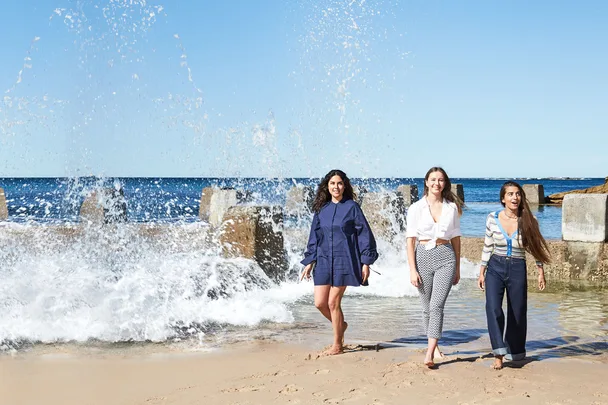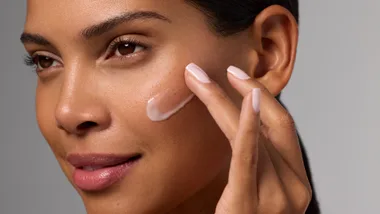Don’t keep calm and carry on. Climate change, pollution, overfishing, ghost nets and coral bleaching are destroying our oceans, and by 2050 they’ll house more plastic than fish. Alley Pascoe spoke to the women fighting to save our seas: Danielle Ryan [left], Sophia Skarparis [middle] and Madison Stewart [right].
DANIELLE RYAN, FILMMAKER
Activism is in Danielle Ryan’s blood. Her mum was one of Sydney’s first environmental lawyers and her grandpa bought property in northern NSW to protect a patch of trees. Now, Ryan is continuing the family’s tree- hugging legacy, making nature documentaries with her partner James Sherwood at Bluebottle Films. Their film, The Map to Paradise, is a powerful call to action for ocean conservation. “Once you teach people about the magic of marine sanctuaries, they get excited about protecting nature,” says Ryan, 36, who is concerned about the government’s cuts to our underwater sanctuaries. “The global scientific community is saying we need to protect a third of the land and the sea by 2020, so Australia needs to step up to meet those targets.”
To stop the damaging cuts to marine protection, Ryan has a pointed message for Prime Minister Scott Morrison: “If I could say one thing, I would ask him politely to step down, and to give a woman who cares about the environment a chance. It’s time for a change.”
SOPHIA SKARPARIS, TEENAGE ACTIVIST
Two years ago, high school student Sophia Skarparis was so enraged by the rubbish strewn across her soccer field that she started a petition to ban single-use plastic bags in NSW. Aged 14, she collected more than 12,000 signatures and scored a meeting with the Premier Gladys Berejiklian. When the motion to ban ocean-polluting, turtle-choking, non-biodegradable plastic bags failed to pass in 2018, Skarparis burst into tears. “It was so disappointing to see that the people who are representing you are not listening to you.”
But the public and big business were all ears. In August 2018, supermarkets Coles and Woolworths went plastic- bag-free. Two months later, Skarparis won the 2018 Young Conservationist of the Year award. Now 16, she’s leading her school’s environmental club, the Green Team, where she’s eradicated single-use plastic and introduced compost bins for food waste. She’s also set up a program to recycle and donate old uniforms at her local soccer club. “We’ve got to have hope,” she says. “Hope and legislation.”
MADISON STEWART, FILMMAKER
Madison Stewart grew up wearing hemp nappies on a yacht on the Great Barrier Reef, a rope tied around her waist so she wouldn’t fall overboard. While other kids were learning to ride a bike, she was becoming a certified scuba diver and swimming with her favourite animal: sharks. “I’ve always been drawn to them; they feel like family. We have a mutual respect for each other,” explains Stewart, aka Shark Girl, now 25.
Her admiration of the species turned to concern when she discovered a legal fishery on the Great Barrier Reef at age 12. Stewart began petitioning to raise awareness about over fishing and shark finning. Her activism led to filmmaking. “I realised that if I wanted to get through to a population in Australia that’s terrified of sharks, perhaps footage of me doing what I love with them could be the best way to do that,” she says.
Her Instagram account, which has 143,000 followers, features stunning underwater videos of Stewart swimming with mako sharks, alongside graphic images of culled tiger sharks, and some hard truths: “On average, 12 people are killed by sharks worldwide a year, but we kill over 100 million sharks annually.”
To address the rapidly declining population and the devastating impact this could have on our marine ecosystems, Stewart says we should stop eating flake and shark- fin soup, and start putting pressure on companies that use the species in their products (namely pet food and make-up brands). “Young people have more power than anyone else and we need to be using it, because we are the ones who will face the consequences,” says Stewart, who is currently retraining Indonesian shark fisherman into the tourism industry. “We can all make a difference.”
Watch: The Future Shapers Campaigning To Save Our Seas
This article originally appeared in the November issue of marie claire Australia.
 Danielle wears C&M dress. Sophia wears vintage Planet shirt sourced from the Sleeveless Society Vintage and no label pants sourced from SWOP Newtown. Madison wears Arnsdorf jeans and vintage Missoni cardigan sourced from the Sleeveless Society.
Danielle wears C&M dress. Sophia wears vintage Planet shirt sourced from the Sleeveless Society Vintage and no label pants sourced from SWOP Newtown. Madison wears Arnsdorf jeans and vintage Missoni cardigan sourced from the Sleeveless Society.









